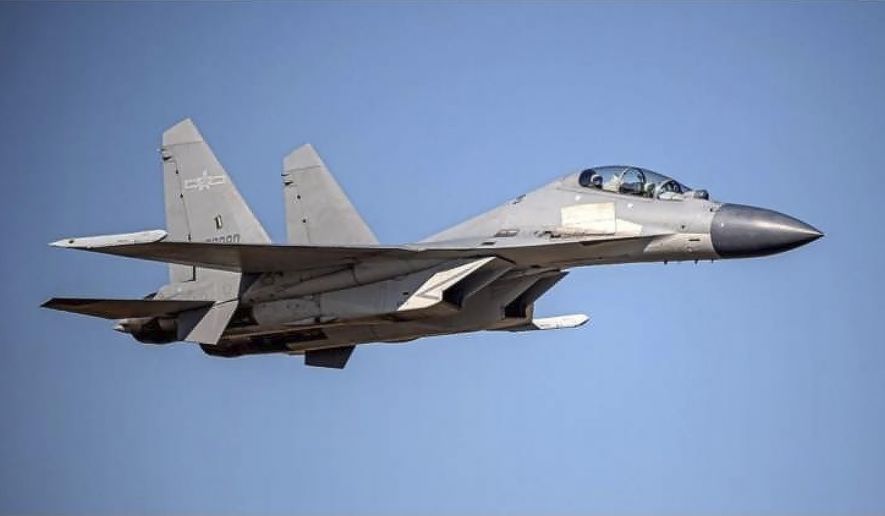China’s buildup of military forces is the largest the world has seen since World War II and has driven Australia and other nations around the world to seek closer security ties to the United States, according to the commander of the U.S. Indo-Pacific Command.
Adm. John Aquilino also said the U.S. military is working with Taiwan to strengthen its defenses as the island-state finds itself under growing pressure from Beijing.
“What I know we’re watching in the region is the largest military buildup we’ve seen since World War II,” the four-star admiral said in remarks at a recent defense conference in California.
Flush from a fast-growing economy, the Chinese military is rapidly modernizing its forces with new missiles, warships, nuclear forces, cyberattack capabilities and space weapons in recent years. The buildup has driven the Australians, in particular, to seek nuclear submarines as part of a new “AUKUS” security pact revealed in September with the United States and Britain, he said.
The submarine deal “was an Australian decision to be able to invest in a nuclear submarine program that provides the capabilities they need against the security threats in the region that they see,”Adm. Aquilino said. “We certainly endorse their decision as we’ve partnered with them,” he said, adding “we’ll develop those capabilities.”
The admiral predicted that AUKUS would be “extremely helpful” in maintaining peace and security in the region, increasing the ability of Australian, U.S. and British forces to coordinate operations and technology.
The new security alliance also has become a target of Chinese diplomatic and intelligence efforts as Beijing regards the new grouping as a key regional threat, according to a senior U.S. official.
Adm. Aquilino said AUKUS is one element of a larger, global effort to enhance security partnerships to confront China. The four-nation “Quad” alliance of the United States, Japan, India and Australia is another. European allies also are seeking closer ties with the United States over concerns about China’s global ambitions, he added.
Indo-Pacom also is increasing the size of and the international participation in its military exercises, holding some 120 military maneuvers each year.
“There’s real concern from the nations in the area on the security challenges,” he said.
The problems posed by an aggressive China extend beyond the Asia-Pacific region and are global in scale, Adm. Aquilino said noting that Beijing changed the name of its global infrastructure investment program from One Belt, One Road, to Belt and Road to make it seem less self-serving and China-oriented.
“There’s a reason it was ’One Belt, One Road’ and that’s because it was good for one nation. But the problem is global,” he said.
Helping Taiwan
Adm. Aquilino said the United States is working with Taiwan to bolster its defenses in the face of military pressure from the Chinese military.
“Recently we’ve seen extensive maritime pressure. We’ve seen pressures in the air domain, certainly in the cyber domain, on the sea, under the sea [and] above the sea,” he said.
“That’s a pretty tough neighborhood, and we execute our responsibility. We talk to Taiwan about capabilities that we think would be beneficial. That said, they get to choose.”
Taiwan is planning to purchase new F-16 jet fighters from the United States and has embarked on a program to build submarines. The Taiwanese military also is developing missiles capable of reaching mainland China, including land-attack cruise missiles.
China has bitterly complained about recent Biden administration moves to bolster bilateral ties with Taiwan, which Beijing considers part of its sovereign territory. Adm. Aquilino said his command is following the 1979 Taiwan Relations Act that calls for selling defensive arms to Taiwan, and longstanding assurances about U.S. policy toward Taiwan are being observed.
“We are contributing to the ability of Taiwan to defend itself,” Adm. Aquilino said. “That’s the responsibility and the task that’s been provided to me. And we are operating in accordance with both policy and law.”
Between Indo-Pacific Command forces and the American defense industry, “we hope to put those capabilities in their hands so that they can ultimately defend themselves in accordance with the Taiwan Relations Act,” he said.
Over the past five years, the United States has stepped up arms sales to Taiwan, offering more than $15 billion in new arms.
However, the Pentagon’s most recent report on the Chinese military indicates the military balance across the 100-mile Taiwan Strait is shifting in China’s favor as the People’s Liberation Army deploys new and advanced missiles and other weapons.
• Bill Gertz can be reached at bgertz@washingtontimes.com.




Please read our comment policy before commenting.